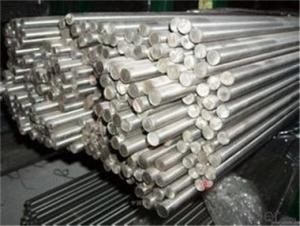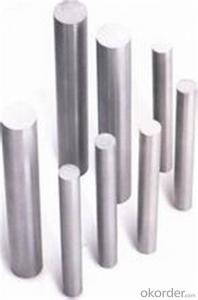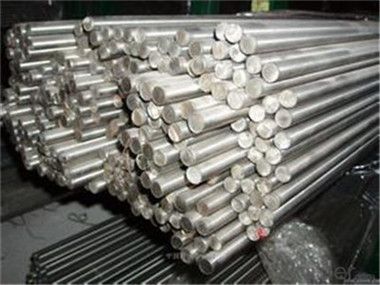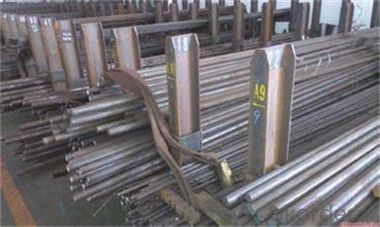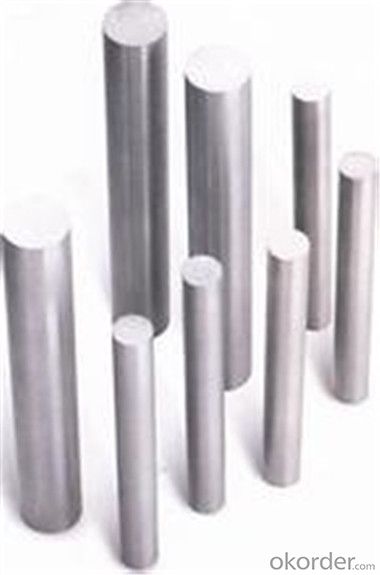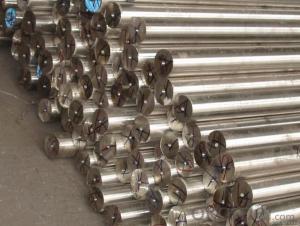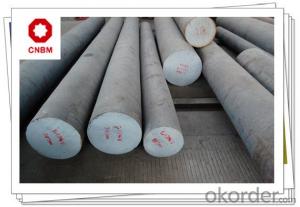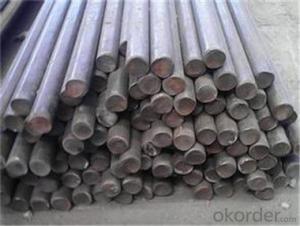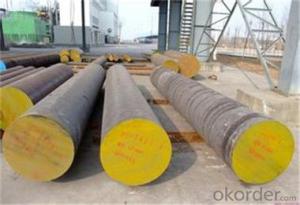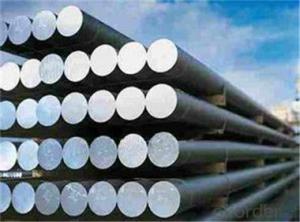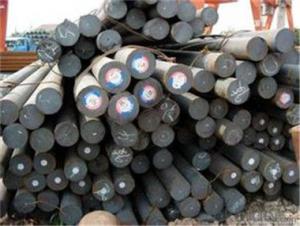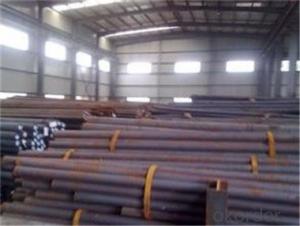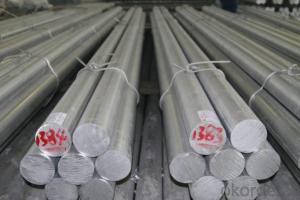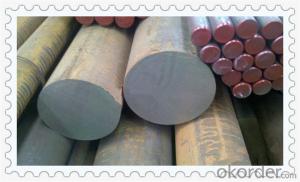Steel Round Bar with High Quality Cheaper SAE1018CR
- Loading Port:
- Tianjin
- Payment Terms:
- TT OR LC
- Min Order Qty:
- 80 m.t.
- Supply Capability:
- 2000000 m.t./month
OKorder Service Pledge
OKorder Financial Service
You Might Also Like
Specification
Description of steel round bar:
Mild steel is sometimes referred to as carbon steel or plain steel. Typically, it is stiff and strong. Carbon steelsdo rust easily, but they can be easily painted or primed. They are cheap so they are the normal choice for most fabrications. Mild Steel can be easily cut or drilled to meet your requests.
Mild Steel Round Bar is used for making security grills, screens, Construction and Machine Manufacture.
Festures of steel round bar:
Can be used in the manufacture of high capacity cutting tools to bear impact force ,such as gear shaper cutter, milling cutter,screw tap,drill bit etc.Also can be used in manufacture of large scale and thermoplasticity shaped cutting tools and antiabrasive cutting tools under high load.
Specifications of steel round bar:
steel c45 s355 scm440
sae 1045 material /s45c carbon steel/sae 1045 steel round bars /
c45 STEEL/round steel material 1035 1040 1045
Grade:C45 S45C CK45 1.0503 EN8 SAE1045 AISI 1045
Diameter:10mm-300mm
Images of steel round bar:
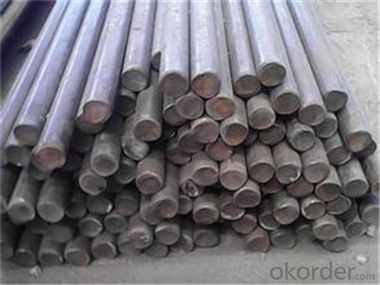
FAQ:
1. What is your package?
Packing situation: standard seaworthy packing or as customer required.
2. How long is the lead time?
Delivery time: 45 days after order confirmed.
3. What payment term do you accept?
Payment: T/T or L/C at sight.
- Q: Can steel round bars be used for making axles?
- Yes, steel round bars can be used for making axles. Steel is a strong and durable material that is commonly used for axles due to its high tensile strength and ability to withstand heavy loads and stress. Round bars provide a suitable shape for axles as they offer good structural integrity and can be easily machined and manipulated to meet specific axle requirements.
- Q: What are the advantages of using precipitation-hardening steel round bars?
- There are several advantages of using precipitation-hardening steel round bars in various applications. Firstly, these bars offer exceptional strength and hardness, which makes them suitable for use in industries that require robust and durable materials. The precipitation-hardening process involves heat treatment, which increases the strength of the steel, making it highly resistant to wear, deformation, and fatigue. Secondly, precipitation-hardening steel round bars have excellent corrosion resistance properties. This makes them ideal for applications in marine environments or industries where exposure to harsh chemicals or corrosive substances is common. The steel's resistance to corrosion helps ensure the longevity and reliability of the components or structures made from it. Another advantage is the versatility of these bars. They can be easily machined, welded, and forged, allowing for flexibility in design and fabrication processes. This makes them suitable for a wide range of applications, including aerospace, automotive, construction, and oil and gas industries. Furthermore, precipitation-hardening steel round bars offer good dimensional stability. They have low rates of thermal expansion, meaning they retain their shape and size even under extreme temperature variations. This characteristic is particularly important in applications where dimensional accuracy and stability are crucial, such as precision engineering or tool manufacturing. Lastly, the availability of a wide range of grades and sizes of precipitation-hardening steel round bars makes it easier to find the most suitable option for specific requirements. Different grades offer varying levels of strength, toughness, and corrosion resistance, allowing for tailored solutions to meet different application needs. Overall, the advantages of using precipitation-hardening steel round bars include their exceptional strength, corrosion resistance, versatility, dimensional stability, and the availability of various grades. These advantages make them a preferred choice for many industries where high-performance and durable materials are essential.
- Q: How do you calculate the fatigue strength of a steel round bar?
- The fatigue strength of a steel round bar can be calculated using various methods, such as the stress-life (S-N) curve approach or the strain-life (ε-N) curve approach. 1. Stress-Life (S-N) Curve Approach: This method involves plotting the stress amplitude (S) against the number of cycles to failure (N) on a log-log scale. The S-N curve is obtained by subjecting multiple specimens of the steel round bar to different stress levels and measuring the number of cycles to failure for each stress level. The fatigue strength of the steel round bar can be determined by identifying the stress level at which the desired number of cycles to failure is achieved, typically referred to as the endurance limit. 2. Strain-Life (ε-N) Curve Approach: This method involves plotting the strain amplitude (ε) against the number of cycles to failure (N) on a log-log scale. Similar to the S-N curve approach, multiple specimens of the steel round bar are subjected to different strain levels, and the number of cycles to failure is measured. The strain-life curve can then be used to determine the fatigue strength by identifying the strain level corresponding to the desired number of cycles to failure. It is important to note that calculating the fatigue strength of a steel round bar requires conducting fatigue tests on representative specimens under controlled conditions. These tests involve subjecting the specimens to cyclic loading, typically in the form of tension-compression cycles, and recording the number of cycles to failure. The obtained data is then used to construct the S-N curve or the ε-N curve, which provides valuable information about the fatigue behavior and strength of the steel round bar.
- Q: What are the different types of tests performed on steel round bars for quality control?
- There are several types of tests performed on steel round bars for quality control purposes. These tests help to ensure that the steel bars meet the required standards and specifications. Some of the common tests conducted on steel round bars include: 1. Tensile Test: This test evaluates the tensile strength, yield strength, and elongation properties of the steel bars. It involves applying a pulling force to the bar until it breaks, measuring the maximum force the bar can withstand, and determining the bar's ability to stretch without fracturing. 2. Hardness Test: The hardness test measures the resistance of the steel bar to indentation or scratching. It provides an indication of the bar's strength and durability. Common hardness tests include Rockwell, Brinell, and Vickers tests. 3. Chemical Composition Analysis: This test determines the chemical composition of the steel round bars, including the percentage of various elements such as carbon, manganese, sulfur, phosphorus, and others. It ensures that the bars meet the specified chemical composition requirements. 4. Ultrasonic Testing: Ultrasonic testing uses high-frequency sound waves to detect any internal defects or discontinuities within the steel bars. This non-destructive test helps identify cracks, voids, or other defects that may affect the bar's structural integrity. 5. Dimensional Inspection: This test ensures that the steel round bars meet the required dimensional tolerances, including diameter, length, and straightness. It involves using precision measuring instruments such as calipers, micrometers, and gauges to verify the bar's dimensions. 6. Surface Quality Examination: This test inspects the surface condition of the steel bars for any defects, such as cracks, pits, scratches, or other surface irregularities. It is crucial to ensure that the bars have a smooth and defect-free surface for proper functionality and safety. 7. Microstructure Analysis: Microstructure analysis involves examining the steel bar's internal structure under a microscope. It helps determine the grain size, inclusion content, and overall microstructural integrity of the bars. This analysis provides insights into the bars' mechanical properties and their ability to withstand various loads and stresses. By performing these tests, manufacturers can ensure that the steel round bars meet the required quality standards and are suitable for their intended applications.
- Q: Are steel round bars suitable for high-temperature applications?
- Yes, steel round bars are suitable for high-temperature applications. Steel is known for its excellent strength and heat resistance, making it a reliable choice for various industries that require materials capable of withstanding elevated temperatures. Steel round bars can maintain their structural integrity and mechanical properties even under extreme heat conditions, making them a popular choice for applications such as furnace components, heat exchangers, and high-temperature machinery.
- Q: Can steel round bars be recycled?
- Indeed, the recycling of steel round bars is possible. Steel, being an immensely recyclable substance, encompasses steel round bars as well. The process of recycling steel round bars entails the gathering of scrap material, its subsequent melting, and the subsequent remolding into fresh steel products. This course of action can be repeated countless times, all while upholding the steel's quality and resilience. By recycling steel round bars, not only are natural resources preserved, but energy consumption and greenhouse gas emissions are also diminished in contrast to the production of new steel. An environmentally conscious choice, recycling steel round bars aids in fostering sustainability and minimizing waste.
- Q: What are the different types of steel used to make round bars?
- The production of round bars involves the utilization of various types of steel. The selection of steel depends on the desired characteristics and applications of the round bars. Carbon steel is a commonly utilized steel for round bars due to its remarkable strength and durability. It finds extensive use in construction, machinery, and automotive components, where a sturdy and inflexible material is required. Stainless steel is another type of steel employed for round bars. It is renowned for its ability to resist corrosion and withstand high temperatures. Applications that necessitate resistance to moisture, chemicals, and heat, such as food processing equipment, medical devices, and architectural structures, often employ stainless steel. Alloy steel, which is formed by combining iron with other elements like manganese, chromium, and nickel, is also used for round bars. This blending enhances its properties, resulting in improved strength, hardness, and resistance to wear and tear. Aerospace components, automotive parts, and machinery often employ alloy steel round bars due to their high strength and toughness. Tool steel, designed specifically for the production of tools and dies, is another type of steel used for round bars. It is renowned for its high hardness, wear resistance, and ability to maintain a sharp cutting edge. Tool steel round bars are commonly employed in applications involving cutting, shaping, and forming, such as drills, punches, and molds. In conclusion, the choice of steel for round bars is determined by specific application requirements, including factors such as strength, corrosion resistance, heat resistance, and wear resistance.
- Q: Can steel round bars be used in the electronics industry?
- Steel round bars can be used in the electronics industry, but their applications are generally limited. While steel is a strong and durable material, it is not typically utilized in electronic components or circuitry due to its electrical conductivity properties. In the electronics industry, materials with high electrical conductivity, such as copper or aluminum, are usually preferred. These materials allow for efficient transmission of electrical signals and minimize losses. However, steel round bars can find some applications in the electronics industry. They can be used for structural purposes, such as providing support or reinforcement to electronic equipment or enclosures. Steel bars can also be utilized in the manufacturing of various mechanical components, connectors, or fixtures used in electronics assembly. Additionally, steel round bars can be employed in the construction of equipment racks, shelves, or storage systems for electronic devices. Overall, while steel round bars may not be directly involved in the electrical aspects of the electronics industry, they can still serve important functions in terms of structural support and mechanical components.
- Q: Are steel round bars susceptible to cracking?
- Yes, steel round bars can be susceptible to cracking under certain conditions. Cracking can occur due to factors such as excessive stress, improper handling, or poor manufacturing processes. However, the susceptibility to cracking can be minimized by using high-quality steel, proper heat treatment, and careful handling and installation techniques.
- Q: What are the different types of steel round bars used in the manufacturing of cutting tools?
- There are several types of steel round bars commonly used in the manufacturing of cutting tools. Some of the most common types include high-speed steel (HSS), tool steel, carbon steel, and stainless steel. Each type has its own unique properties and characteristics that make it suitable for specific cutting applications. For example, HSS is known for its high hardness, toughness, and heat resistance, making it ideal for high-speed cutting operations. Tool steel, on the other hand, is known for its exceptional wear resistance and ability to retain sharp edges, making it suitable for cutting tools that require long-lasting performance. Carbon steel is often used for general-purpose cutting tools due to its affordability and good balance of hardness and toughness. Lastly, stainless steel is chosen for cutting tools that require excellent corrosion resistance, making it suitable for applications in harsh environments or when working with corrosive materials.
Send your message to us
Steel Round Bar with High Quality Cheaper SAE1018CR
- Loading Port:
- Tianjin
- Payment Terms:
- TT OR LC
- Min Order Qty:
- 80 m.t.
- Supply Capability:
- 2000000 m.t./month
OKorder Service Pledge
OKorder Financial Service
Similar products
Hot products
Hot Searches
Related keywords
